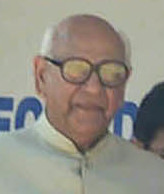R. L. Bhatia facts for kids
Quick facts for kids
Raghunandan Lal Bhatia
|
|
|---|---|

Bhatia in 2005
|
|
| 23rd Governor of Bihar | |
| In office 10 July 2008 – 28 June 2009 |
|
| Chief Minister | Nitish Kumar |
| Preceded by | R. S. Gavai |
| Succeeded by | Devanand Konwar |
| 16th Governor of Kerala | |
| In office 23 June 2004 – 10 July 2008 |
|
| Chief Minister | A. K. Antony Oommen Chandy V. S. Achuthanandan |
| Preceded by | T. N. Chaturvedi (Additional Charge) |
| Succeeded by | R. S. Gavai |
| Personal details | |
| Born | 3 July 1920 Amritsar, Punjab, British India |
| Died | 14 May 2021 (aged 100) Amritsar, Punjab, India |
| Political party | Indian National Congress |
| Parents | Arooramal Bhatia, Lal Devi Bhatia |
| Alma mater | University of the Punjab |
Raghunandan Lal Bhatia (born July 3, 1920 – died May 14, 2021) was an important Indian politician. He served as the Governor of Kerala from 2004 to 2008. After that, he became the Governor of Bihar from 2008 to 2009. He also played a key role in signing the Border Peace and Tranquility Agreement with China for India.
Contents
Early Life and Education
Raghunandan Lal Bhatia was born in Amritsar, Punjab, on July 3, 1920. His parents were Arooramal Bhatia and Lal Devi Bhatia. He went to the University of the Punjab in Lahore. There, he earned a law degree. After finishing his studies, he worked for the local government of Amritsar for nine years.
A Career in Politics
Bhatia started his career in national politics in 1972. He was first elected to the Lok Sabha, which is one of the two houses of the Indian Parliament. He represented the Amritsar area. He was re-elected to the Lok Sabha several times. These elections were in 1980, 1985, 1992, 1996, and 1999. He was a member of the Indian National Congress party.
Important Roles in Government
During his time in the Lok Sabha, Bhatia held many important positions.
- He was a member of the Congress party's executive committee from 1975 to 1977.
- From 1992 to 1993, he served as the Minister of State for External Affairs. This meant he helped manage India's relationships with other countries.
- In 1983, he was the Chairman of the Committee of Petitions in Lok Sabha. This committee looked into requests and complaints from citizens.
- He led the Punjab Pradesh Congress Committee from 1982 to 1984.
- In 1991, he became the General Secretary of the All India Congress Committee (AICC).
- He also helped change the Indian constitution in 1992 as a member of a special committee.
Representing India Abroad
Raghunandan Lal Bhatia traveled a lot to represent India.
- He was a delegate for India at the United Nations.
- In 1983, he attended the 7th Non-Aligned Movement (NAM) summit in Delhi.
- He also went to the Commonwealth Heads of Government Meeting in New Delhi in November 1983.
- In 1991, he participated in the Sixth SAARC summit in Colombo.
- He was part of a meeting in Delhi in 1986 for non-aligned countries.
Promoting International Friendship
Bhatia also worked to build friendships between India and other countries.
- He was a member of the India Council for Cultural Relations from 1983 to 1984.
- He was the chairman of the India Bulgaria Friendship Society from 1983 to 1990.
- He also led the Indo-GDR Friendship Association during the same period.
- From 1981 to 1983, he was co-chairman of the All India Peace & Solidarity organization.
- He was the Vice President of Friends of Soviet Union from 1983 to 1984.
Becoming a Governor
In 2004, Bhatia became the Governor of Kerala. He took over this role after the previous governor, Sikander Bhakt, passed away. He served as Governor of Kerala for four years.
In 2008, he was appointed Governor of Bihar. He switched places with the then-Governor of Bihar, R. S. Gavai. Bhatia officially took office on July 10, 2008. He left this position in 2009 and then lived a private life.
Later Years
Raghunandan Lal Bhatia passed away in 2021. He died from COVID-19.
 | Charles R. Drew |
 | Benjamin Banneker |
 | Jane C. Wright |
 | Roger Arliner Young |

